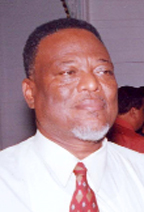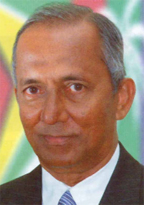-slams silence on tax reform, investment plan
PNCR-1G MP Winston Murray yesterday criticised the government’s 2010 budget as big on spending but short on good policies, saying the measure of its worth is the impact it makes on the lives of ordinary citizens.

Murray called the budget “unexciting” as he kicked off the annual budget debate in the National Assembly and he accused Finance Minister Dr Ashni Singh of concealing more than he revealed during the presentation last week. He charged that the budget is conspicuously silent on a number of key issues, including tax reform and an aggressive programme for seeking out investors and investments.
Murray, his voice soaring across the National Assembly, insistently asked about job creation and what number of jobs, if any, the administration hopes to create this year, since according to him, the budget makes no mention of it. He declared that prosperity is nowhere around the corner based on the projected growth rate this year.
In a speech punctuated with a string of questions about what people will get from the budget, Murray offered up a basic conclusion on what Guyanese can expect in 2010–continued struggles. “…In it, I daresay, they would see no respite from the burdens they bear, their personal and family futures would not sparkle with hope as a result of it,” he told the Assembly.
Oppressive tax burden
He said statements about “no new taxes” in the budget this year means nothing, because nothing has been done to lift “the oppressive burden of taxation on the citizenry.” He called on the government to return the VAT windfall to the people through a reduction, while noting that there is also need for a graduated progressive rate of income tax to be reintroduced.
But Prime Minister Samuel Hinds rebutted, saying that the people with an open mind would

assess the budget and realise its focus is on building the country. “The budget is exciting,” he declared, to a vociferous endorsement from members of the government benches. He said the budget was written with the average citizen in mind and insisted that if vision appears to be lacking in the budget it is visible in a number of other places.
Hinds said government understands that people are seeking a better life and, according to him, this is a key focus of the administration and its budgetary provisions this year. Issues such as health, water, housing and security are high on the agenda this year, he noted, adding that the citizenry is a critical aspect of the budget planning. “We’ve had a good thing going with the way our budget had been presented and our growth rate has been steady,” the Prime Minister added.
However, Murray ripped into budget, saying that even if the projected rate of 4.4 % is achieved the average growth would only increase from 2.8% to 3%. This, he said, is unlikely to have any significant positive impact on the chronic and growing level of unemployment. He said too that an annual rate of 3% for a (low/middle income developing country) is hardly the basis on which prosperity can be built or expected in the foreseeable future.
Murray said his party believes in certain prerequisites for real growth and he listed comprehensive tax reform; clear and uniformed ground rules for investment; a facilitating institutional framework and an aggressive programme for seeking out investors as critical factors. He pointed to several sectors in the country where millions of dollars are spent but “progress is slow” and suggested that quantifiable, verifiable targets should be set in the budget as part of an overarching medium-term strategy.
Murray spoke largely uninterrupted and commanded the attention of the government benches. He condemned what he called the lack of consultations on the budget and called on the finance minister to make the necessary changes and consult directly with organisations; labour; private sector stakeholders, including employers; and even opinion leaders on issues such taxation and its effects on consumers, prices, wages and salaries among other things. “…I urge the minister to return to what had become a tradition of consultation as part of the budget preparation,” he said.
He touched briefly on the national debt, saying the US$933 million stock of debt at the end of last year represents new money borrowed by the government, but that “this was not mentioned.” He called for a careful monitoring of the situation, saying that Guyana remains a country that is moderately at risk of debt distress.
Bitter prospects
Perhaps Murray’s most critical assessment came when he decided to speak on the sugar industry. He concluded that the industry is nowhere near the picture painted in the budget and outlined a number of problems facing the industry, including failed production targets; an inadequate cane supply; a factory still not operating at capacity and the projected two years before the industry returns to marginal profitability. He said that taxpayers are basically subsidising an industry that is being managed poorly by “political appointees. …One is bound to consider seriously whether it is not the case that the heavy capital investment in sugar is more consistent with political calculations than with economic ideas and logic. While the PNCR-1G wishes the industry well we cannot honestly say we are excited by its prospects.”
He questioned too whether the administration has any appetite for Foreign Direct Investment (FDI), saying that it raises the issue of whether the administration fears the presence of a large international company could affect its absolute control over the economy.
He raised the problems in the bauxite industry and issues in the agriculture sector, saying that there is no reasonable basis for great expectations any time soon. He also slammed the Low Carbon Development Strategy (LCDS), saying the government may have been neglecting other important policy issues to pursue the strategy and “in the process also incurred the wrath and fury of miners and foresters, among others.”
Hinds countered that government decided not to privatise sugar and close bauxite as was suggested in some quarters. He said too that it welcomes the FDI from RUSAL and Bosai, adding that his government is not happy with the furore that erupted between RUSAL and the union in the Berbice area. He sparked a slight ruckus in the Assembly when he mentioned that Linden is “bigger and brighter” today even though employment in the bauxite operations has fallen steadily. Hinds singled out Amelia’s Ward and Block 22. The comment triggered harsh statements from members on the opposition benches and culminated with calls for him to “Sit down now.”
The Prime Minister focused his speech on what he said were clear signs of development in the country. He pointed to the electricity and telecommunications sectors, citing ongoing projects towards improvement for the “benefit of the people.” He also spoke of the Amaila Falls hydropower project and the project to drill for oil in the Takutu basin, saying the country is advancing.
Hinds said time prevented him from responding to a number of the positions Murray took in his presentation, but he urged the PNCR-1G member to trace back to his party’s own policy on the issue of FDI. He confidently stated that his colleagues, who are yet to debate, would take on Murray.
Further, the Prime Minister also defended the government’s decision to keep the lotto resources and the proceeds from the sale of public assets in the Consolidated Fund, after Murray attacked the current policy, saying a number of institutions have called for such inflows to be put into separate accounts so that “they could be followed more closely and not thrown into the Consolidated Fund where they could be mixed up with everything else.”
